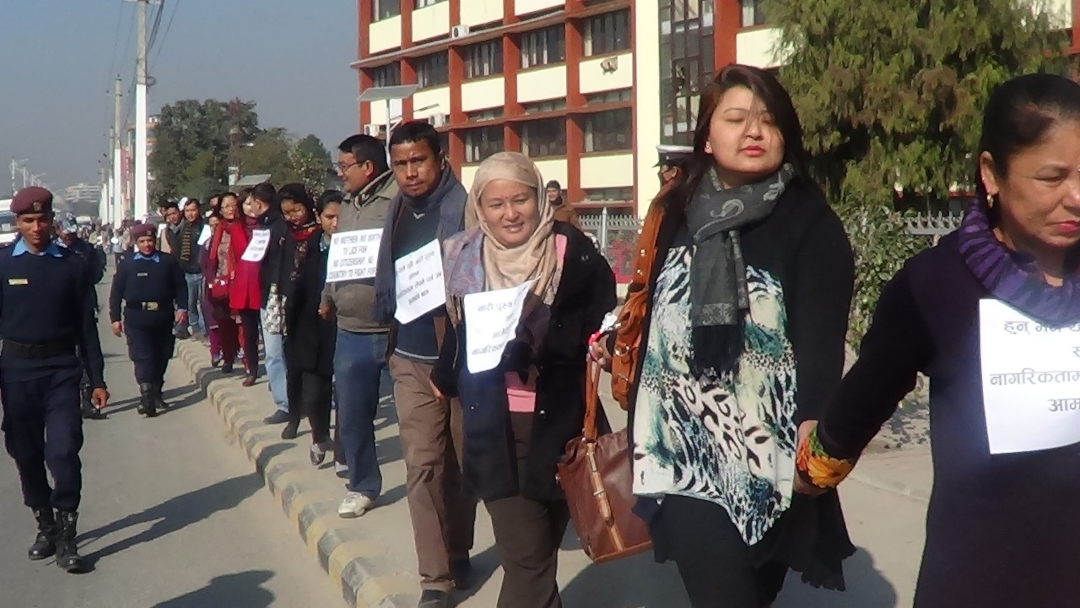Due to the gender-discriminatory citizenship laws of Nepal, I was a stateless person till the age of 45. I had applied for citizenship through my mother immediately after passing school, but to no avail. As a result, I was unable to pursue higher education nor apply for a job. I did get to complete my bachelors (as the college did not inquire about my citizenship at the time of admission) but I was disallowed to join the masters program which abruptly halted my chances of pursuing higher education. Left with no choice, I started teaching school children. Meanwhile, I also taught myself how to draw political cartoons by watching online tutorials.
Fortunately, with my mother being a school teacher, I always had great admiration and respect for the teaching vocation. At first, I taught students residing in her hostel, then I moved on to teaching at different schools. Without a masters degree, however, I was limited to teaching middle school students (grades 6-8). The only certificates I had were the ones given after completion of trainings and workshops. However, I took great pride in being a teacher, as I felt honored to contribute to my students’ developmental journey. Plus, I was in awe of how learning occurs in young people which constantly motivated me to learn more about the science of education and learning. Thankfully, the subjects I taught, English and Social Studies, provided lots of opportunities to discuss diverse topics that frequently went beyond the textbook and often even the curriculum! But there were no opportunities for meaningful professional and academic growth. Towards the end of 2008, I quit teaching after having taught for 6 years in one of Nepal’s biggest private schools.
I decided to join my younger brother who was pursuing 3D animation which was a niche market at the time. More than anything I believed that the creative field would provide me a safe haven where I could pursue my livelihood without needing a citizenship. But fate had other plans for me.
In 2009, I got a unique opportunity to work for an English daily as a member of their editorial team. This became possible as a colleague had strongly vouched for my English proficiency and my keen interest on a broad range of topics which would be useful for the op-ed page. Despite my interest to pursue this new-found opportunity, after one-year I had to move to Pokhara to be assist my better half with her restaurant business. However, after three years, we had to return to Kathmandu due to financial reasons. Upon returning, I joined a mountaineering agency for whom I wrote contents for their adventure tourism packages to be published on their website and brochures. This lasted for just over a year.
Then the teaching vocation called me again and I joined a very well-known school in 2012 as an 8th grade English and Social Studies teacher. This time I was armed with valuable insights that I had gained during my stints in journalism and tourism sectors. Those experiences had truly enriched me as a teacher and allowed me to see many important issues from close quarters, which I happily shared with my students.
Meanwhile, my better half had been pursuing a legal battle for citizenship through my mother's name and finally in 2019 the Supreme Court decided in my favor. I was 45 years old at the time. It had taken 29 years since I first applied for citizenship after passing grade ten. One of the first things I did upon getting my citizenship was join masters program in education (and lo I was promoted to teach A-Level students immediately!).
All this while, my wife and I had been approached by various Nepali stateless people, mainly single mothers and youths, who were denied citizenship due to the discriminatory nationality laws. We felt it was our duty to help them as we had gained some experience on the issue. Soon, we were approached by national and international human rights activists, lawyers and academics, as well. With my wife at the helm, I joined hands in solidarity with them to raise my voice against gender-discriminatory citizenship laws in Nepal. During the drafting of Nepal's new constitution, I helped organize protest rallies, used my drawing skills to help the cause, and more importantly shared my views in public debate forums with the hope of inclusion of a gender-equal citizenship clause in the new constitution. Unfortunately, it was not to be, hence the problem persists.
With a lived-experience of being stateless for almost three decades, I am highly aware about the psychological, social, and economic impacts it can have on individua and render them vulnerable in multiple ways and scenarios. These can range from facing outright violence to being subjected to subtle sarcasm that a person with citizenship would never endure. This is reinforced by the apathy of the general public which forces stateless people to be invisible in plain sight. Just like I had been when I taught students about justice and equality for 27 years without them ever knowing that I was a stateless person. Moreover, the deeply entrenched administrative and political flaws make it almost impossible for stateless individuals to navigate the legal and administrative hurdles to find justice. As someone privy to their appalling conditions after meeting them and listening to their stories, I felt a strong sense of responsibility to assist them. Walk away from them was never an option. Thus, armed with nothing else but my personal experience of statelessness, I decided to assist however I could. This decision culminated in partnering with my better half in creating a national movement against statelessness and also reaching out globally where similar problems persisted. This eventually led to the establishment of Citizenship Affected People's Network (CAPN), out of absolute necessity more than anything else, to address statelessness, both, individually and collectively.
On a personal note, never had I imagined working for this cause full time. Fate seems to have put me at the forefront of this battle based on my lived experience of being stateless to do my bit in finding rightful solutions. I am more than grateful to oblige in the name of humanity, peace and justice.

